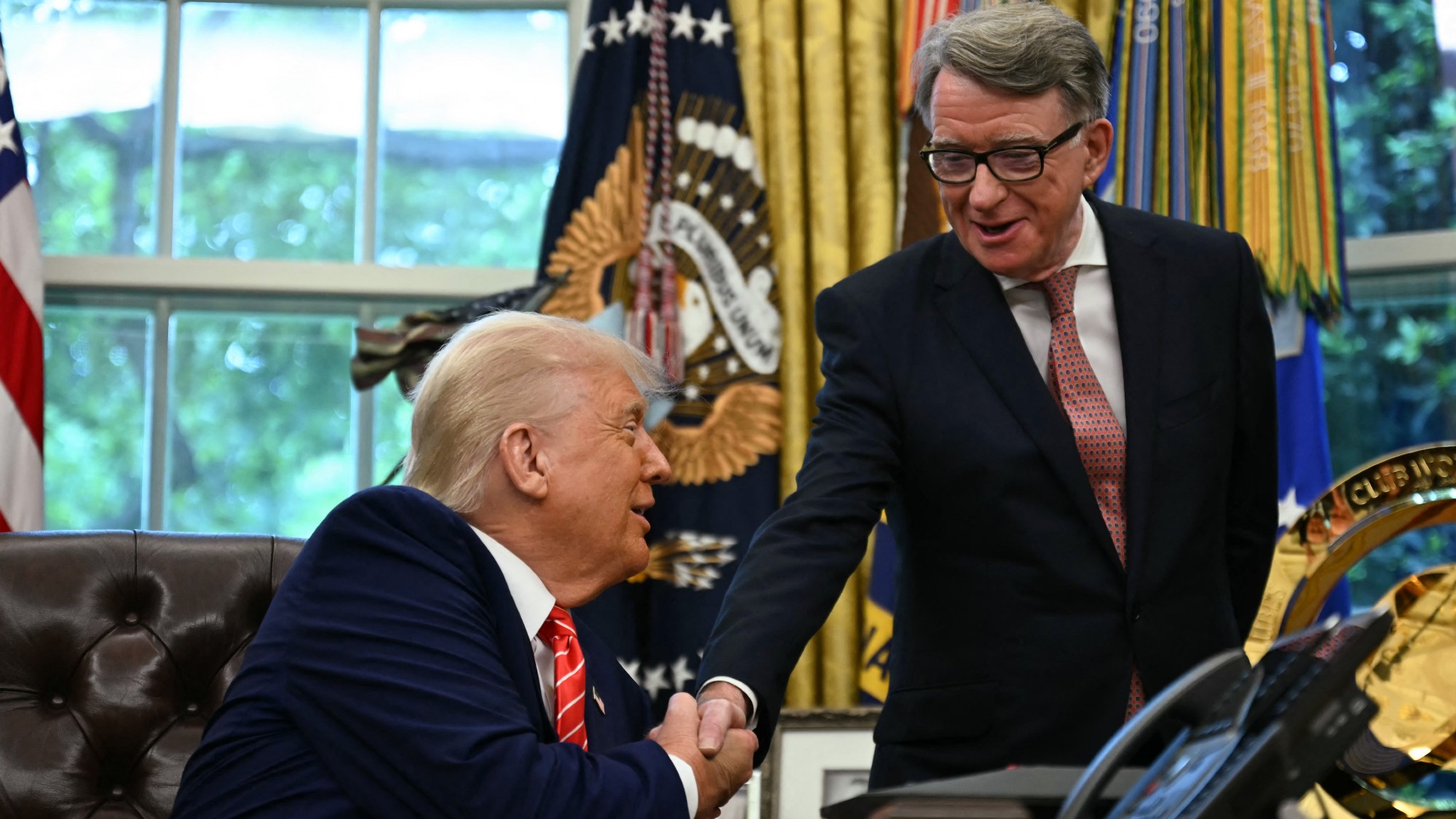The UK-US trade deal: what was agreed?
Keir Starmer's calm handling of Donald Trump paid off, but deal remains more of a 'damage limitation exercise' than 'an unbridled triumph'

A free daily email with the biggest news stories of the day – and the best features from TheWeek.com
You are now subscribed
Your newsletter sign-up was successful
Washington and London hailed a "historic" agreement last week after the UK became the first country to seal a deal with President Trump since he launched his global trade war.
The deal cut US tariffs on British car exports from 27.5% to 10%, and removed all levies on British steel, aluminium and Rolls-Royce engines. In exchange, the UK offered greater market access to US agricultural exports, including beef and corn ethanol, although it retained its ban on chlorine-washed chicken and hormone-treated beef.
Trump announced the deal in a televised event in the Oval Office, flanked by Britain's US ambassador, Peter Mandelson; Keir Starmer joined by speakerphone. No. 10 later described it as a "win for both nations" and promised to build on it. Kemi Badenoch, the Tory leader, said Britain had been "shafted", noting that the deal provides less-favourable trading terms than we had before Trump's "liberation day".
The Week
Escape your echo chamber. Get the facts behind the news, plus analysis from multiple perspectives.

Sign up for The Week's Free Newsletters
From our morning news briefing to a weekly Good News Newsletter, get the best of The Week delivered directly to your inbox.
From our morning news briefing to a weekly Good News Newsletter, get the best of The Week delivered directly to your inbox.
Starmer should be congratulated for this deal, which has saved thousands of British jobs, said The Independent. His calm, non-confrontational approach to Trump has paid off. The PM did well to get the UK to the front of the queue, agreed The Times. The fact remains, though, that this is more of a "damage limitation exercise" than "an unbridled triumph". Most UK goods still face a blanket 10% tariff. And the lower levy on British cars only applies to a quota of 100,000, which matches our current level of exports to the US, effectively placing "a ceiling on future sales".
Much remains to be hammered out, said the Daily Mail. There's still no clarity over pharmaceuticals, for instance, or Trump's threatened film tariffs. The worry is that Starmer will scupper further progress in his "desperation to reset relations with the EU", whose leaders he is meeting next week. Reducing friction with the EU, our largest trading partner, is the key to boosting our economic growth, said the FT. Compared with this, the deal with the US, like the earlier one with India, is "little more than a sideshow".
A free daily email with the biggest news stories of the day – and the best features from TheWeek.com
-
 6 exquisite homes with vast acreage
6 exquisite homes with vast acreageFeature Featuring an off-the-grid contemporary home in New Mexico and lakefront farmhouse in Massachusetts
-
 Film reviews: ‘Wuthering Heights,’ ‘Good Luck, Have Fun, Don’t Die,’ and ‘Sirat’
Film reviews: ‘Wuthering Heights,’ ‘Good Luck, Have Fun, Don’t Die,’ and ‘Sirat’Feature An inconvenient love torments a would-be couple, a gonzo time traveler seeks to save humanity from AI, and a father’s desperate search goes deeply sideways
-
 Political cartoons for February 16
Political cartoons for February 16Cartoons Monday’s political cartoons include President's Day, a valentine from the Epstein files, and more
-
 Currencies: Why Trump wants a weak dollar
Currencies: Why Trump wants a weak dollarFeature The dollar has fallen 12% since Trump took office
-
 Elon Musk’s starry mega-merger
Elon Musk’s starry mega-mergerTalking Point SpaceX founder is promising investors a rocket trip to the future – and a sprawling conglomerate to boot
-
 TikTok: New owners, same risks
TikTok: New owners, same risksFeature What are Larry Ellison’s plans for TikTok US?
-
 Trump wants a weaker dollar, but economists aren’t so sure
Trump wants a weaker dollar, but economists aren’t so sureTalking Points A weaker dollar can make imports more expensive but also boost gold
-
 Will SpaceX, OpenAI and Anthropic make 2026 the year of mega tech listings?
Will SpaceX, OpenAI and Anthropic make 2026 the year of mega tech listings?In Depth SpaceX float may come as soon as this year, and would be the largest IPO in history
-
 Leadership: A conspicuous silence from CEOs
Leadership: A conspicuous silence from CEOsFeature CEOs were more vocal during Trump’s first term
-
 Ryanair/SpaceX: could Musk really buy the airline?
Ryanair/SpaceX: could Musk really buy the airline?Talking Point Irish budget carrier has become embroiled in unlikely feud with the world’s wealthiest man
-
 Powell: The Fed’s last hope?
Powell: The Fed’s last hope?Feature Federal Reserve Chairman Jerome Powell fights back against President Trump's claims